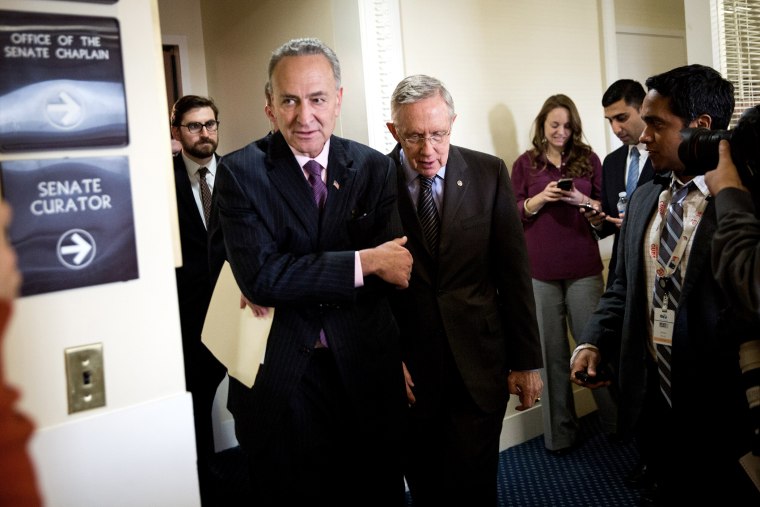After Senate Democrats voted Thursday to move forward with the “nuclear option” to push through judicial appointments, Republicans are in uproar -- clamoring that Democrats are turning the Senate into the partisan and gridlocked House.
“The Senate in our system was the example to the world that there was a way in democracy to protect minority rights,” Republican Roy Blunt of Missouri said on Friday’s The Daily Rundown. “To a great extent, that’s now lost on these nominations.”
Under the controversial rule change, federal judicial nominees and executive-office appointments can advance to confirmation votes with a simple majority of senators, rather than the traditional 60-vote supermajority.
Blunt, who formerly served as a chief deputy whip in the House, criticized the legislation, saying the Senate has already become too much like the House with “a one person rules committee.”
“That is not the way the Senate should work, nor the way our system serves as an example to the world of how democracy can work with minorities still being respected,” he said.
Since Obama assumed the presidency, however, Republicans in the minority have drastically increased their use of the filibuster to block Democrats’ proposed legislation.
In President Obama’s five years in office, 79 of his nominations have faced at least one vote to end cloture, which is usually held to end a filibuster. That’s compared to only 38 such votes for President Bush’s nominees during his two terms.
As a result, Democrats say they hope going nuclear will help restore what has become an inefficient and unproductive Congress when it comes to presidential nominations. If the Senate has become more partisan like the House, it’s the GOP’s fault, they argue.
“We had to change the rules now because the perpetual war on the executive branch and judicial branch are completely out of sync with our constitutional role of advice and consent,” Sen. Jeff Merkley said on Friday’s The Daily Rundown. The first-term Oregon Democrat had been a champion of the rule change since he arrived in the Senate in 2009.
But in an interview with Chuck Todd, American Enterprise Institute’s Norm Ornstein, an expert on Congress and American politics, said that the Senate had already been heading down the road towards partisan warfare regardless of Thursday’s filibuster changes.
“The last 20 years we have seen a steady decline in bipartisan cooperation and what has been a partisan and ideological polarization has become almost tribal in nature now,” said Ornstein. “The situation between the parties has been deteriorating enough that I doubt very much that a rules change itself is going to make it a whole lot worse.”
After the legislation passed Thursday afternoon, President Obama praised Democratic successful filibuster reform efforts.
“We've seen an unprecedented pattern of obstruction in Congress that’s prevented too much of the American people's business from getting done,” the president said during a press conference. “The vote today I think is an indication that a majority of senators believe, as I believe, that enough is enough. The American people's business is far too important to keep falling prey, day after day, to Washington politics.”
